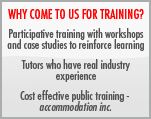Ex 15.3 - FAILURE MODE AND EFFECTS ANALYSIS (FMEA)
Overview
Failure Mode and Effects Analysis (FMEA) enables companies to improve customer satisfaction and reduce product liability risk by anticipating and preventing defects in design and manufacture. This ONE-DAY course introduces students to the FMEA methodology, applying it to product and process design, and demonstrates how the results of the FMEA are used to define the requirements for:-
- An effective product validation plan
- An effective control plan for the manufacturing process.
Companies supplying the automotive industry, or seeking compliance and
registration to ISO/TS 16949 are required to use FMEA techniques to achieve
product assurance, but the techniques are equally applicable to all other
market sectors.
When properly applied these tools will:-
- Speed up the development process and reduce the number of late changes
- Reduce the risk of project failure due to late delivery and cost overruns
- Improve customer satisfaction and reduce warranty costs
Key Session Topics
- The business need for FMEA in product and process design
- FMEA methodology and defining the:-
- Customer’s expectations and requirements
- Potential failure modes
- Consequences of failure
- Methods of detection and prevention
- Risk priority number (RPN)
- Evaluating the “risk” using the RPN and prioritising areas for improvement
- Implementing corrective actions in product and process design
- Defining special characteristics and developing a control plan
- Case studies:
- Product Design FMEA
- Process FMEA
Benefits
- Hands on experience in how to produce an FMEA
- An understanding of how the FMEA fits into the overall design process and why it should be regularly updated
Who Should Attend
- Product developers involved in developing new product introduction strategies
and concerned with 'time-to-market'.
- Manufacturing managers and engineering managers who need to improve manufacturing
capability, predict initial product yield and improve cross-functional technical
communications.
- Design engineers responsible for new product design and introduction
who need to improve customer definition and manufacturing feedback.
- Quality/Reliability managers and engineers who want to facilitate
an understanding and application of these tools within their organization.
- Process engineers who will be involved in formulating the manufacturing Control Plan
Course Techniques
Understanding is developed through the use of tutorial sessions and practical interactive workshops and case studies, which provide the student with the opportunity to put the skills taught during the course into practice.
Follow-Up
Consultancy assistance with documentation and implementation programmes
can be provided.


